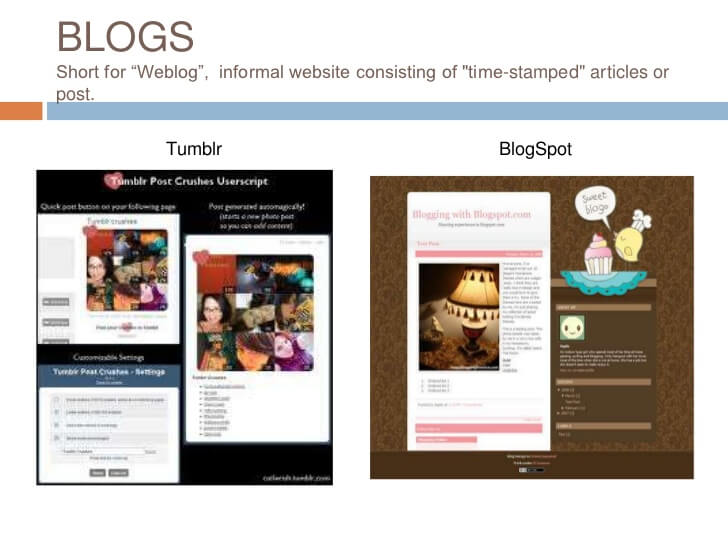Today, weblogs, wikis, and various other social networking tools are seemingly indispensable fixtures of modern-day society. The ubiquitous nature of social media combined with the media’s unique characteristics highlights the need for Web users to recognize how these characteristics may influence information derived from these sources.
Accordingly, this article is devoted to social media and its unique evaluation challenges. The article begins with an overview of social media followed by a brief discussion about two popular types of social media tools and services: weblogs and wikis. The article concludes with a discussion of several specific evaluation challenges presented by social media.
The term social media refers to a wide variety of Internet and mobile networking applications, such as weblogs (blogs), wikis, microblogs, and more. Social media applications generally share a number of common characteristics: “(a) interactivity,(b) collaboration, (c) aggregation, (d) incremental content, and (e) content replication” (U.S. National Archives and Records Administration 2008).
These applications allow families, friends, business associates, and the general public to readily communicate and share information, interests, and opinions with other members of their personal networks or to broader audiences.
Social media usage has surged over the past few years thanks to the popularity of sites such as MySpace, Facebook, Twitter, YouTube, Wikipedia, and various other sites and services. Social media embodies the ongoing static-to-dynamic evolution of Web pages and sites.
Also similar to the World Wide Web overall, social media represents an amalgam of traditional and new media elements; likewise, social media content can be created by professionals or everyday individuals. Indeed, social media affords individuals an opportunity to share their self-produced media content with a global audience, a practice previously reserved almost exclusively to large multinational media corporations.
In fact, social media content is becoming increasingly integrated with its traditional media counterparts as television networks, newspapers, and radio stations incorporate ever larger amounts of social media content and applications into their programming, Web sites, and other ancillary activities.
For example, viewers of the Cable News Network (CNN) are encouraged to submit their own photos and videos of newsworthy events to CNN’s iReport.com Web site. The photos and videos submitted to iReport.com are then made available for public viewing on the site.
In addition, selected “iReports” are later featured on CNN’s cable television news-related programs. A notice displayed across the top of the iReport.com home page informs visitors that stories submitted to the site “are not edited, fact-checked or screened” with the exception of stories that have been “vetted” aired on CNN. These stories are accordingly marked “ON CNN”. (Cable News Network Inc. n.d.).
The next section examines weblogs and wikis, two commonly used social networking applications.
What are Weblogs (Blogs)
Weblogs, frequently referred to simply as blogs, are one of today’s favored forms of online communication. In a nutshell, a Weblog refers to a Web site that functions as an unedited online journal for the blogger (author). The blogger’s periodic journal entries, which usually appear in reverse chronological order, are variously known as blogposts, weblog posts, postings, or merely posts.
Many bloggers also make it possible for readers to post comments about their blogposts on the site. Finally, bloggers and blogposts are collectively referred to as the blogosphere (Technorati 2008; U.S. National Archives and Records Administration 2008; U.S. Legal Services Corporation 2007).
A blog can be formal or informal in nature; consist solely of text posts; or alternately incorporate photos, video clips, or RSS (Really Simple Syndication) feeds. The specific content and character of any individual blog varies according to a number of factors, including, among others, the personality and technical proficiency of the blog’s creator and the amount of time the creator can devote to blogging.
Initially regarded as just another online venue for individuals to share their life experiences, opinions, hobbies, or pastimes, blogging has rapidly grown in popularity as its communicative powers are more fully appreciated by the wider society. The expanding power and prestige of blogs is reflected by the number of businesses, organizations, and governmental bodies that have jumped aboard the “blog bandwagon” over the past few years.
What are Wikis?
Wikis are another widely used type of social media application. A wiki is defined as “a Web site that includes the collaboration of work from many different authors.” Each wiki posting “is versioned so that postings can be compared.” In addition, “all past entries are kept in a log as a version of the evolving discussion.”
Wikis can be used for a variety of tasks, including (a) collaborative writing, (b) collaborative projects, (c) “finding consensus around an issue or concept (e.g., virtual meetings), and (d) vocabulary development” (U.S. National Archives and Records Administration 2008).
Like weblogs, wikis are being used by a diverse array of groups and organizations.







